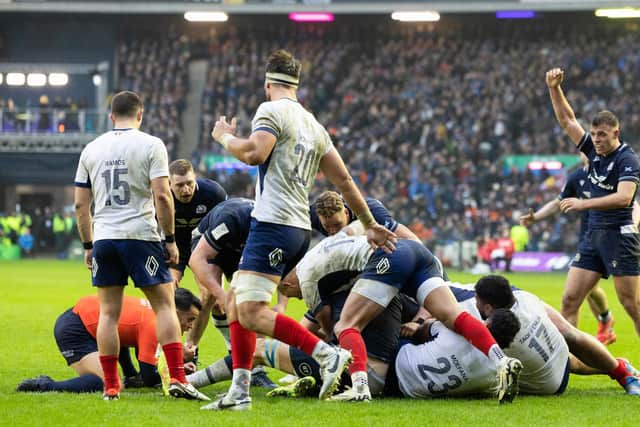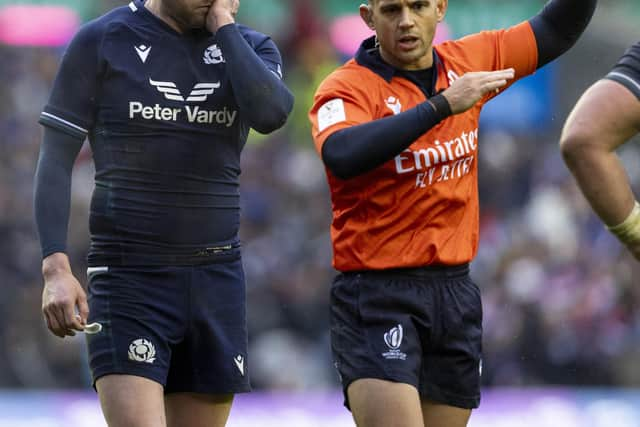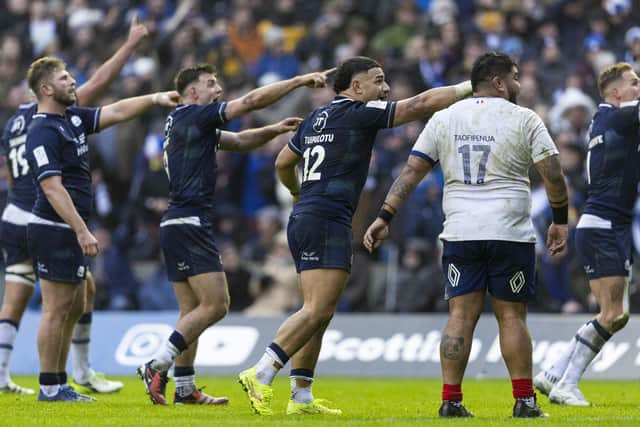Fraser Brown: Rugby needs to revamp its laws - Scotland v France incidents just emphasise the overhaul required
I still genuinely don’t know what to feel after the events of Saturday at Murrayfield. I’m not sure if I’m gutted, angry or frustrated. Scotland should have won, there’s no doubt in my mind.
The decision at the end was a farce, and I believe that Sam Skinner’s try should have stood but to lay the blame for the loss on the final play of the game is far too simplistic for a match packed with talking points. The reality is that Scotland had enough chances to put the game to bed well before the dramatic finale.
Advertisement
Hide AdAdvertisement
Hide AdPutting Scotland’s performance to one side for a moment, I believe that the game at the weekend again highlighted a much bigger issue for the future of rugby. If you’re a new fan to the sport and watching that Scotland-France game you’d be thinking: ‘What is going on here? I don’t understand any of this. Someone has scored a try but it’s not been given. I don’t get it’. Our sport seems to be doing its utmost to make the game difficult to watch and engage with for the most ardent fan, let alone the casual supporter trying to pick it up.


Rugby is competing in a massively congested sports and entertainment market. You are trying to grab as much attention as you can from the viewing public and make the game as exciting and simple to understand as possible. Rugby needs to revamp its laws. To survive as a professional sport, to thrive and grow, it needs a major overhaul.
Back to the game and back to the final play. Initially, the ball is sitting on France player Yoram Moefana’s boot, then it comes off his boot and is on the floor. The ball is grounded. There has been talk about Posolo Tuilagi’s hand being under the ball but have you seen the size of his hands?
Moefana did unbelievably well. He deliberately tries to get his feet beneath the contact to hold Sam Skinner up. It’s very, very clever play. Jordie Barrett did this at the World Cup off the back of a maul and probably won the game for New Zealand. When I’ve been in camp with Scotland and Glasgow we’ve practised scenarios where someone carries against us on the tryline and we try to wrap the ball and land underneath the man with the ball to hold him up. It was smart play by Moefana and listening to Shaun Edwards after the game, something they had identified during the week and practised.
Was there another opportunity for Scotland to score during those last couple of minutes? In the phases prior to the final phase, Sione Tuipulotu can be seen asking for the ball whilst Kyle Rowe is in acres of space on the right wing. Both could have walked in the match-winning points. Scotland kept battering away with the forwards and did enough to cross the line but, as everyone now knows, the score wasn’t given.


The decision was left to match referee Nic Berry and TMO Brian MacNeice and it’s hard to get your head round the ‘no try’ decision given the pictures they saw and the dialogue that ensued between the pair. Berry’s initial on-field decision to not award the try is totally justified, he can only give what he can see. I don’t like the fact that the referee must give a definitive decision on the pitch in cases like this, but that’s the way the law is written.
You could clearly see the ball was initially on Moefana’s boot but what I don’t understand, and I think many of us watching the game don’t understand, is how we get to a point where MacNeice is telling Berry that the ball has moved off the boot and is on the ground but the try is still not awarded. Once you’ve said that, there is no way back. That is a try.
MacNeice has guided Berry all the way to the point where Berry is ready to reverse his on-field decision and award the try. And then McNeice backtracks, claiming he cannot be certain. Nowhere in the laws does it say that you must have definitive proof. That’s why rugby is so subjective and it’s why referees are allowed to make decisions.
Advertisement
Hide AdAdvertisement
Hide AdSometimes rugby is guilty of creating guidelines and frameworks that decisions can be hidden behind. This is not a criticism of the officials, they are doing what is being asked of them, but why can referees not be given the power to make calls based on their own expertise, experience, and judgement? Perhaps Berry and MacNeice would end up making the same decision at the weekend, but at least then we’d know it was because that’s what they thought had happened rather than what they think can or can’t be proved.


There will always be debate around referee calls as there is in every sport but let’s make people accountable for them rather than the system. The game is subjective in so many aspects; borderline passes, knock-ons, the breakdown – let the officials make decisions based on how they see it, not how the framework tells them to.
For me, the TMO system is not working and that’s backed up by other incidents from Saturday. There was a very obvious neck roll from Posolo Tuilagi which we saw live but was not picked up by the TMO. In the first half, Duhan van der Merwe was lucky not to be shown a yellow card for his intercept from an offside position near Scotland’s goalline. Had that been picked up (and it should have) than it would almost certainly have also been a penalty try to France.
We need to change the way the process works. The whole idea of using video footage in cricket, tennis, football – even though VAR is much maligned – is to get to the correct decision. But in rugby we are not getting the correct decision. Rugby league does it much better than we do. The NRL makes quick decisions and most of them are right. And there’s not this back and forth between referee and TMO. The TMO comes in, makes the decision and gives it to the referee.
The TMO in rugby union often is not allowed to make a decision. He tells the referee what he is seeing and his opinion and the referee makes the decision. It’s too convoluted. And I’m not sure having extended dialogue between referee and TMO broadcast to the whole stadium is a good thing. If you look at the weekend, the crowd is reaching fever pitch listening to that conversation.


Having said that, I do think the referee should be able to communicate an explanation to the stadium when a decision is reached. By allowing the ref to explain the decision, and how it was reached, it gives the fans in the crowd a more informed experience.
I think the officiating team at the weekend missed a lot. Apart from the Skinner ‘try’, there were several other incidents including knock-ons, holding off the ball and forward passes, that weren’t picked up. The breakdown was a mess, with players going off their feet defensively, in at the side, no release from tacklers and hands on the floor.
Legitimate criticism of the officials for their performance and for making errors is acceptable in the same way it is for players. Accountability drives standards across the board, and we should all want a higher standard of rugby. However, it’s important to stress that abuse, whether of officials, players or coaches, is abhorrent and should never be permitted in our sport.
